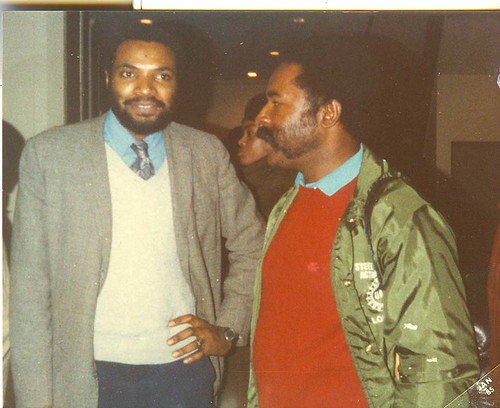
Abayomi Azikiwe (L) and Jesse Hooper after a South African Hero's Day Rally was held at New Bethel Baptist Church on December 16, 1984. The event featured two speakers from the African National Congress. (Photo: Pan-African News Wire)., a photo by Pan-African News Wire File Photos on Flickr.
Winnie Mandela: Biopic Reveals the Suffering and Triumphs of the South African Struggle
Film comes to the theaters in U.S. after three years in obscurity
By Abayomi Azikiwe
Editor, Pan-African News Wire
Since 2011 the film “Winnie Mandela” starring Jennifer Hudson and Terrance Howard has remained a mystery to many within the United States and internationally.
The production was shot in South Africa and it attempts to re-introduce the life of both Nelson and Winnie to a new generation of people who were not even born when the African National Congress (ANC) leader was released from prison in February 1990 after over 27 years of detention.
Mrs. Winnie Mandela during the 1980s and early 1990s became the most prominent figure in the decades-long fight to free her husband and liberate the African masses from the apartheid ‘colonialism of a special type’ as it was described during the period.
Winnie was often depicted in the international news media as a strong and defiant woman who refused to compromise with the racist system and consequently suffered tremendous repression by the state and ridicule by the corporate press.
This film was directed and co-written by South African filmmaker Darrell James Roodt and premiered at the Toronto Film Festival in 2011. The script is based on Anne Mari du Preez Bezdrob’s biography entitled “Winnie Mandela: A Life.”
Some critics took a negative view of the production and it never made it to the U.S. theaters until September. The film was rescued by the television evangelist and businessman T.D. Jakes through his Image Entertainment. If this had not happened the film may have languished longer before making it to the theaters or eventual cable television outlets.
Even prior to the brief release in Canada in 2011, the early news reports on the film were related to the criticism leveled against the project by Winnie Mandela herself. The ANC veteran was quoted as making harsh statements about the movie saying that she was never consulted about how she was to be depicted by Jennifer Hudson.
The Creative Writers Union of South Africa also complained about the leading roles not being given to South African actors.
Additional reports alleged that the producers of the project frowned upon the possibility of Hudson meeting Mandela prior to or during the filming.
Winnie Mandela was quoted by the Guardian newspaper in London during 2011 saying of the film that "I think it is an insult. I don't know what would be romantic in our bitter struggle."(Guardian, June 14)
Mandela later told CNN: "I have absolutely nothing against Jennifer [Hudson, the film's star], but I have everything against the movie itself. I was not consulted. I am still alive, and I think that it is a total disrespect to come to South Africa, make a movie about my struggle, and call that movie some translation of a romantic life of Winnie Mandela." (Guardian, June 14)
Film Highlights South African Struggle
The film does highlight the anti-racist struggle of the South African people between the 1950s and the 1990s. Beginning with the childhood of Nomzamo Winfreda Zanyiwe Madikizela (Winnie) it illustrates her determination to overcome both race and gender barriers.
She attends school and it outstanding in her accomplishments. Mandela would later win a scholarship to study in Johannesburg becoming a social worker in a hospital.
She is drawn to the movement of the 1950s where the Campaign of Defiance Against Unjust Laws was waged and the Freedom Charter was drafted. She would later meet Nelson Mandela and become is second wife.
However, there was never any honeymoon. The lawyer is committed to the overthrow of the racist system and becomes a target of the state security forces.
Much of his time is spent on the road organizing and evading the police. He is arrested in 1962 and convicted the following year of treason and sabotage.
Mandela and his comrades within the ANC and its armed wing, Um Khonto We Size, could have been sentenced to death but international pressure resulted in sentences of life imprisonment.
Hudson and Howard reveal the emotional and psychological impact of the long term imprisonment of Nelson and the constant harassment by the state of Winnie who was sixteen years his junior. Winnie is repeatedly arrested and spends over a year in solidarity confinement where the state security personnel attempt to break her psychologically and turn her against the ANC.
The film illustrates the unsuccessful efforts by the apartheid state to demoralize Winnie and Nelson. Although Winnie faced much criticism from even those within the movement during the latter years of Nelson’s incarceration, Nelson Mandela is released in 1990 to lead the African people to political power in 1994 when the ANC won an overwhelming victory against its racist opponents.
Of course the film also depicts the emotional toll of the years of isolation and repression of both of the leading figures. The marriage ends in separation and divorce after Nelson’s release and his ascendancy to power.
This film portrays the capacity of the individual, backed up by the mass movement, to overcome the ravages of oppression and attempts by the enemy to denigrate the symbols of resistance and emancipation.
Consequently, it can serve as a window into the study of the actual history of South Africa which provides much for the ongoing movements against racism, national oppression and economic exploitation in Africa and indeed around the world.
No comments:
Post a Comment